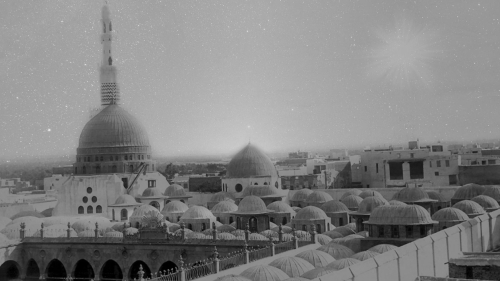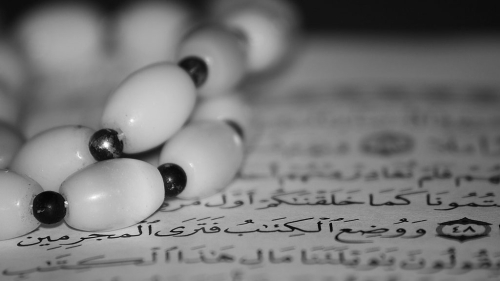Qualities of an Exemplary Leader

"Owing to Mercy from God, you were gentle in dealing with them [your companions]. Were you harsh [and crude], hard of heart; they would have fled from you. Therefore, pardon their abuses, seek [God's] forgiveness for them, and consult them in the affair. Once you have resolved on a course of action [be decisive] and trust in God. Surely, God loves those who trust in Him." Qur'an 3:159
This verse contains a wealth of instruction to guide those who are leaders, and as Muslims we should all be leaders. The Prophet mentioned, "All of you are shepherds, and each of you will be asked concerning his flock."[1] Let us examine some of the implications of the verse relevant to leadership.
Owing to Mercy from God... God is reminding His prophet, peace upon him, that the mercy he displays, in fact all of the virtues or favors that he enjoys are all from God. This is a critical point for any leader to realize, because of the propensity of those in positions of leadership to assume that they are in those positions because of something they have done. While it is certainly true that in many instances, hard work and perseverance have assisted a particular individual in his or her rise to the top, even the possession of those qualities is due to God.
Acknowledging this at the very beginning of our affair is one of the keys to real power as it helps to render us humble, and humility before people unlock for that person the power of God. The Prophet Muhammad, peace upon him, mentioned in that regard, "No one humbles themselves for the sake of God except that God elevates him."[2]
Those who doubt the efficacy of such an approach-forgetting this was the way of our Prophet Muhammad, peace and mercy of God upon him-should consider the insights offered by Jim Collins in his book, Good to Great. He mentions what he calls Type 5 Leaders. They are those exceptional leaders who lead companies in their transition from being good to great. [3] They combine personal humility, which is essential for gentleness in one's dealings, with intense will. This unique combination of virtues is the essence of the message this verse is presenting to us, as we shall see.
Recognizing that everything comes from God is also one of the keys to gaining an increase in good things, for we can not give thanks for a blessing we do not recognize. In recognizing God for blessing us with the qualities that may have helped us to become capable leaders, we are able to thank Him for those blessings. Hence, we are subject to a rule He has established to govern our etiquettes in responding to a blessing, If you give thanks [for my blessings] I will increase you in them... (Quran 14:7)
Recognizing that everything comes from God also helps us to realize our limitations. We come to understand that we must work hard to accomplish our goals. However, at the end of the day, we do not control the outcomes of our strivings. As soon as we can accept that fact we instantly gain peace of mind, for we do not endeavor to burden ourselves with things beyond our control. Furthermore, when in positions of leadership, we are less likely to look for oftentimes innocent parties to blame for failures that occur. This helps to create a healthier and more productive work environment for everyone.
...you were gentle in dealing with them [your companions]. "Gentleness does not exist in anything except that it beautifies it, and it is not removed from anything except that it defiles it."[4] In many instances when we are in a leadership position we try to impose our authority on others. In some instances this only engenders stubborn rebellion and opposition. In others it brings about grudging compliance. Neither situation is healthy. Gentleness, on the other hand encourages willing compliance.
Were you harsh [and crude], hard of heart; they would have fled from you. Here God is telling His prophet, peace upon him, that despite your charisma, your concern for the believers and all of your other positive characteristics, were you harsh and hard-hearted, your companions would have left you. Therefore, you must avoid those characteristics. This is a lesson for us in terms of how we should approach leadership and positions of authority.
People who are harsh in their leadership styles oftentimes demand respect. They should be mindful of the fact that respect that is demanded is seldom lasting, and it is never sincere. People who are gentle in the appropriate situations, compassionate, empathetic and magnanimous command respect. Respect that is commanded is sincere and lasting.
Leaders who are fair and gentle attract talented individuals, while those that are harsh are usually intimidated and threatened by talented people and generally repulse them. Their insecurity is sensed by talented people who are secure within themselves. This leads to them shying away from harsh individuals. This in turn leads to a corrupt or incompetent inner circle developing around leaders who demand respect through harsh treatment and crude mannerisms. The Prophet Muhammad, peace upon him, mentioned that when God desires good for a leader He gives him a good circle of advisers. The opposite is also true. [5]
In the long run, magnanimity will always trump tyranny. Tyranny may achieve temporary victories, but the fruit of those victories is bitter and the season of its harvest is very short. This is true in interpersonal relations as well as in relations between nations. We have to strive to be people who at every level are committed to being open-hearted and magnanimous in our character.
Therefore, pardon their abuses... We should be quick to pardon others, where our rights are involved, or where the transgressions we observe arise from ignorance. One of the greatest lessons we enforce upon ourselves when we are quick to pardon is that perfection is God's alone. Recognizing that, we do not expect perfection from ourselves, nor do we expect it from others. We do strive for perfection and constant improvement. However, we realize that perfection is simply not our lot in life. When our parents, spouses, children, employees, coworkers, and others understand that they have room for error in their dealing with us they are more relaxed and therefore less likely to err. This is a simple yet unappreciated truth.
Also, we have to understand that when we are merciful and forgiving, we invite God's mercy and forgiveness into our life. God mentions in the Qur'an, O believers! Verily, among your spouses and children are those that are enemies unto you. If you pardon them, overlook their faults and seek forgiveness for them; then you should know that God is Oft Forgiving and Most Merciful [to you]. (Quran 64:14)
Our Prophet reminded us, "The merciful people are those God will show mercy to..."[6] This tradition involves a promise and a principle. It is especially relevant for leaders, for those leaders who show no mercy, will be shown no mercy-neither by God, nor by those they oppress if they ever gain the upper hand over them. One rare exception is the mercy our Prophet Muhammad, peace upon him, showed to the members of his tribe, Quraysh, once he was given authority over them.
Seek God's forgiveness for them... When we seek God's forgiveness for someone we are acknowledging that there is only so much we can do for them. After that we are implicitly saying that we are deputing their affair to God, who can do so much more for them. We are also letting them know that we are concerned for their ultimate wellbeing and salvation.
When this message is conveyed to our subordinates we will find them most happy and committed, ready to serve, for they understand that we do not just see them as an asset to be exploited, rather we see them as a servant of God who we can help along on the road to salvation.
And consult them in the affair. Mutual consultation is one of the pillars of social relations in Islam. As the saying goes, "Two heads are better than one." The more people we can involve in a project or decision, the more thorough our approach to that project or decision will be. Islam has high respect for the idea of due diligence in public decision-making methodology. We should deliberate and consult before making what will sometimes be far-reaching decisions. One of the reasons for our contemporary weakness is that we have gotten away from this idea.
Here the Prophet, peace upon him, who is divinely guided in religious affairs, in the broadest sense of religion, is encouraged to consult his companions because he is laying the foundation for effective rule and leadership to guide those succeeding him. However, we will only be the beneficiaries of the wisdom he bequeathed to us if we implement those teachings in our lives. This area of endeavor is no exception.
We should also understand that a team will always accomplish more than a single individual. These instructions will help us to build strong teams. We should also understand that "good" can always be "better." One of the first things mentioned by Abu Bakr, may God be pleased with him, upon assuming the Caliphate, was, "If I do well help me to do better." Abu Bakr, may God be pleased with him, was sending out two messages. The first was that I can always do better but only with your help. The second was an invitation to get involved. Good leadership does not wait for involvement to happen, it actively encourages it.
Once you have resolved on a course of action [be decisive]... Once a course of action has been chosen it must be accompanied by decisiveness. Great leaders are decisive, after due diligence has been exercised. The greatest of all leaders, the five great prophets, Noah, Abraham, Moses, Jesus and Muhammad are described as Ulul 'Azm the possessors of decisive resolve. No one will follow an indecisive leader. Decisiveness is a function of will. This is the second quality mentioned by Collins in, Good to Great.
In confronting the challenges before us as Muslims in this country we should understand that resolve is one of the qualities we will need to have. God mentions in the Qur'an, You will surely be tested in your wealth and your lives and you will hear from those given the scripture before you and from the idolaters much abuse. If you patiently persevere and remain mindful of God, [you should know] that is a manifestation of resolve. (Quran 3:186)
As we listen to the defamation of our religion and the slander of our Prophet, peace upon him, we should not allow that to dishearten us or turn us away from the good works we are doing. We should persevere, we should forge on, and we should realize that we are not violating any laws nor transgressing against any of the principles upon which this nation was founded-even thought the nation itself oftentimes does not honor those principles.
And trust in God... God never disappoints. When we trust in Him, we will never be disappointed. People will eventually disappoint us, in real or perceived ways. Although those disappointments usually do not result in any permanent damage to our relationships they can be frustrating. When we place our trust in God we remove this great cause of our frustrations.
When we trust in God, we also are less demanding of people. This is one of the ways to encourage others to do more for us in a spirit of willful volunteerism. What is given voluntarily is given sincerely. Sincerity is a quality that helps bring blessings to our actions. Ultimately, the value of our actions is associated to the blessings they contain, and not their abundance.
God loves those who trust in Him. If God is for us no one can be against us. As leaders we want God on our side. This is one of the keys in moving from good to great, for when we ally ourselves with God we ally ourselves with the source of all strength and power. Trusting in God is just one of the things we can do to invite His love. He mentions in the Qur'an, Verily, God loves those who do good. (2:195) Surely, God loves those who turn to Him in repentance. (2:222) ...and God loves those who purify themselves. (2:222) God loves those conscious of him. (3:76) God loves those who manifest excellence in their faith. (3:134) God love those who are patient. (3:146) Verily, God loves those who rely on him. (3:159) God loves those who are just. (5:42)
Hence, trusting in God, being good and excellent in all of our affairs for His sake, turning to him in repentance, being conscious of Him, purifying ourselves, patiently persevering and being just, these are all qualities and actions that invite God's love into our lives.
When we are beloved to God then, as He mentions in a sacred tradition (hadith qudsi), "I become the hearing with which he hears, the sight with which he sees, the hand with which he grasps and the feet that convey him. [In this state] if he were to ask anything of Me, I would grant it. And were he to seek my protection, I would protect him."[7] This does not mean that God becomes a part of us. However, it does mean that He will bless us to use all of our faculties in ways that are pleasing to Him.
What could be better or more beneficial for us than this?
Notes:
[1] Al-Bukhari #893
[2] Al-Tirmidhi, #2029
[3] Jim Collins, Good to Great (New York: Harper Collins, 2001), 17-40
[4] Abu Dawud, #2477
[5] Al-Bukhari, #7198
[6] Al-Tirmidhi, #1924
[7] Al-Bukhari, #6502
Related Suggestions
Though I support the contents of the article as a whole, I would like to differ on one point regarding the abuse and humiliation of our belover Prophet (pbuh). There were several occasions during the time of our Prophet (pbuh) wherein the companions reacted violently to any humiliating remarks or acts against the Prophet (pbuh). Moreover, even the Prophet (pbuh) himself had ordered retalioatory actions against those who defamed or abused him or Islam or the Muslims. In verse 3:186 Allah warns the Muslims that there will be all kinds of opposition from the enemies of Islam including personal abuses, but these things should not deter Muslims from carrying out their mission. No doubt, every one should respect the law of the land, but that doesn't mean that a Muslim should remain silent and compromisin when their beloved Prophet (pbuh) is abused.
Please read Tafsir Ibn Kathir on [3:186] @ The Believer is Tested and Hears Grieving Statements from the Enemy
http://www.tafsir.com/default.asp?sid=3&tid=10088
It's important to take part in democratic struggle to defeat the motives of people who defame prophet or Islam in a civilized society with the help of peace loving people.
Best regards.
I hope all Muslim political leaders and those who aspire to political leadership accross the world take time to understand these facts.
Massalam
I wonder what he would have done to those disagreed with his vision or total unbelievers and athiests! Punish them or pursuade them or leave them alone?
One thing is very clear. Millions of his followers over centuries, it seems entertained pretty different ideas! Any one dare speculate!
Kam
I really did enjoy reading this article. I especially liked the way that the author used Quran and hadith to show proof after his points. It is nice to have someone writing about an issue and supporting it with Quran and hadith. Not with what Martin Luther King Jr. and others have said.
The author is so right if leaders would treat their people with the respect that the Prophet (pbuh) and Abu Bakir did, we would be so much better off today. Yes, we definitely need to stop with the mentality of mine and "I." It really should be about "us."
I think this was a well written article, one that all of us could learn something from.
Thanks Islamicity for this nice article.
Salam Alaikum,
Fatimah Muhammad
"God loves those who trust in Him. If God is for us no one can be against us. As leaders we want God on our side. This is one of the keys in moving from good to great, for when we ally ourselves with God we ally ourselves with the source of all strength and power. Trusting in God is just one of the things we can do to invite His love. He mentions in the Qur'an, Verily, God loves those who do good. (2:195) Surely, God loves those who turn to Him in repentance. (2:222) ...and God loves those who purify themselves. (2:222) God loves those conscious of him. (3:76) God loves those who manifest excellence in their faith. (3:134) God love those who are patient. (3:146) Verily, God loves those who rely on him. (3:159) God loves those who are just. (5:42)"
I however wonder why the author omits (intentionally?) the must important amongst these wonderful verses talking about the love of Allah; i'm refering to 3:31 which goes thus:
"Say ('O' Muhammad) if ye do love Allah, FOLLOW me (and) Allah will love you and forgive you your sins; for indeed Allah is oft-forgiving, the most merciful"
This means the conviction of loving Allah could only be sufficient and rewarding if the beloved prophet is follwed. Allah did not say love Me and I will return the jesture but follow the prophet ie when you trust, trust the way the prophet trusted and reverred Allah, and when you do good, do the way the prophet did good, when you repent use the du'as the prophet taught for such actions, when you purify, purify according to how the prophet used to purify himself, to be concious of Allah use the azkar the prophet did and follow his way of doing he azkar,...every act of worship prescribed by Allah (like the five pillars) do them the way the prophet did NO ADDITION NO DELETION.. our ways of muamalat ( marriage, trade, etc) should be according to the authentic ahadith of the prophet given to us through his companions and ...

















